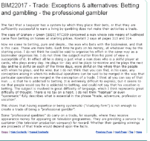barjon
Legendary member
- Messages
- 10,752
- Likes
- 1,863
this thread was made for information and seems to have turned into a b*tchfit session....
Sure does and it's amazing how people plough on with their own versions 🙂
At the moment the thing is pretty clear cut (see thumbnails):
1. Spreadbetting is considered to be "betting" (gambling) - CG56105 (first thumbnail)
2. Gambling winnings are not taxable - BIM 22017 (second thumbnail)
It should be noted that this judgement concerned a man whose sole means of livelihood came from betting.
For the time being HMRC live by those "rules" and although they might seek to move the goalposts (they'd have to change the definition of spreadbetting or get the BIM 22017 judgement overturned first) it's extremely unlikely that they would do so retrospectively. Mind you, I suppose anything is possible from our beloved tax gatherers 🙂


